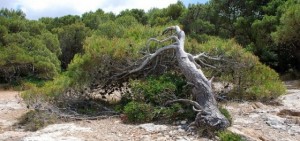Zöld Izrael » Növények, Természet » Trees That Don’t Stand a Chance Against Climate Change
Trees That Don’t Stand a Chance Against Climate Change
 Sad news so soon after the Jewish New Year for the trees: Many tree species might become extinct due to climate change if no action is taken in time: This is the conclusion of a new research study from the Hebrew University. According to the research, trees which disperse their seeds by wind, such as pines and maples, will be unable to spread at a pace that can cope with expected climate changes. The research, which focused on the ecological consequences of expected changes in the climate and the environment on tree spread, was conducted by Prof. Ran Nathan and his student, Nir Horvitz.
Sad news so soon after the Jewish New Year for the trees: Many tree species might become extinct due to climate change if no action is taken in time: This is the conclusion of a new research study from the Hebrew University. According to the research, trees which disperse their seeds by wind, such as pines and maples, will be unable to spread at a pace that can cope with expected climate changes. The research, which focused on the ecological consequences of expected changes in the climate and the environment on tree spread, was conducted by Prof. Ran Nathan and his student, Nir Horvitz.
“Our research indicates that the natural wind-driven spread of many species of trees will increase, but will occur at a significantly lower pace than that which will be required to cope with the changes in surface temperature,” said Prof. Nathan.
“This will raise extinction risk of many tree populations because they will not be able to track the shift in their natural habitats which currently supply them with favorable conditions for establishment and reproduction. As a result, the composition of different tree species in future forests is expected to change and their areas might be reduced, the goods and services that these forests provide for man might be harmed, and wide-ranging steps will have to be taken to ensure seed dispersal in a controlled, directed manner.”
On the basis of earlier work, elevated concentration of carbon dioxide is expected to cause trees to produce many more seeds and to reach maturity earlier than under current conditions, hence speeding up their spread. On the other hand, the weakening of wind speed in certain areas should reduce spread rate of these trees. The balance between these opposing forces remained unknown.
The new research showed that the faster spread predicted for these trees in the future will be much slower than the expected poleward shift of climate (temperature) ranges. Consequently, these tree species might not be able to withstand the climate change.
Published in the journal Ecology Letters, the research provides a mechanistic model developed to predict trends in plant spread. Predictions which were made until now were founded on past trends and did not take into consideration the expected future changes in the key biological and environmental factors that determine plant spread.
In Israel, the research has bearing on various native tree species whose seeds are dispersed by the wind, such as Aleppo pine, Syrian maple and Syrian ash. The model that has been developed will be useful also in predicting the invasive spread of alien tree species, such as the tree of heaven, into Israeli natural habitats. It might be able to be used by planners investigating how to replant after the massive Israel forest fire.
Hand-sown seeds?
Trees with wind-dispersed seeds are mainly common in forests of North America and Eurasia. The current research points to the need to take human action to insure the dispersal of the seeds of these trees within the next half century, in view of the expected climate changes.
“It is important for those responsible for forest management in many parts of the world to understand that nature alone will not do the job,” said Prof. Nathan.
“Human action will be required to ensure in a controlled manner the minimization of unexpected detrimental byproducts, and that those trees which are very important for global ecological processes will not become extinct,” he said.
Forrás: http://www.greenprophet.com/2011/01/trees-climate-change/#more-39557
Kategória: Növények, Természet · Cimkék: change, climate, disappear, tree







